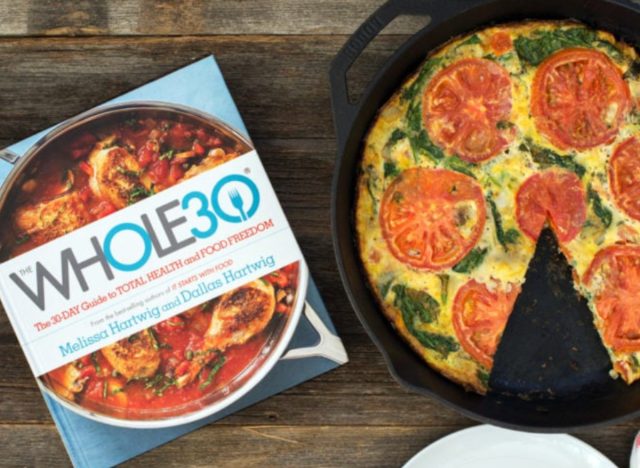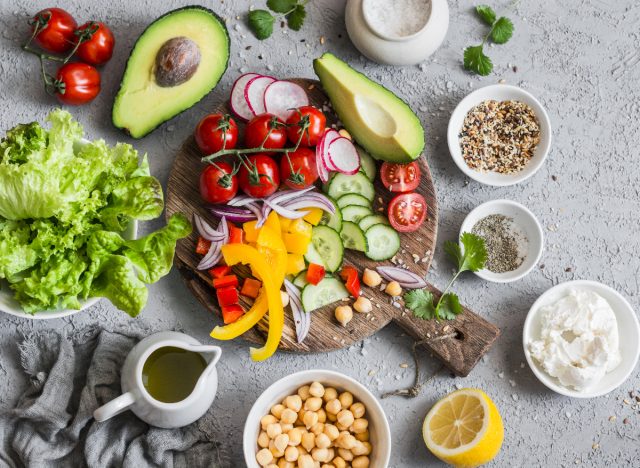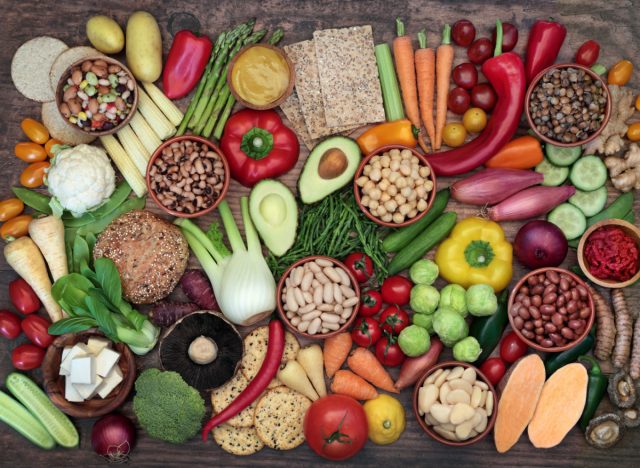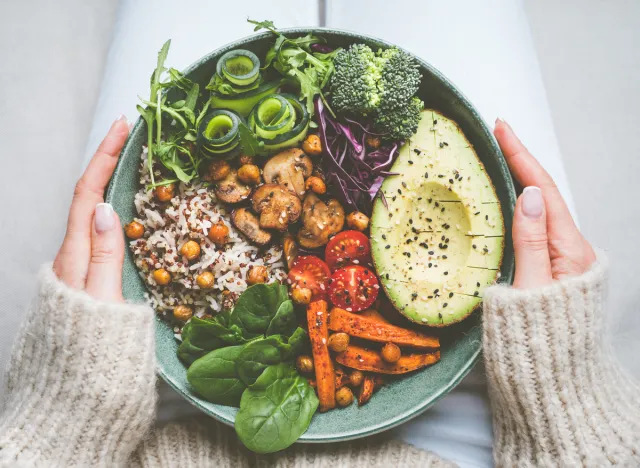Clean eating can mean different things to different people. While to some, this dietary approach means no fast food, others may view it a bit more restrictively, eating only foods that have undergone zero processing. Whatever your definition of clean eating, this approach is one that promotes foods that have undergone minimal processing, like fruits, vegetables, grains, and lean proteins, and allows for fewer pre-packaged foods that are made with preservatives, additives, and other ingredients associated with processed foods.
When considering improving your approach to nutrition—whether for weight loss, to improve health metrics, or just to shake up your eating habits—there are so many diets and food challenges to try. One benefit of trying a clean eating challenge is structure. Having a clear outline of what to eat, what not to eat, and a timeline from start to finish can be encouraging and make a daunting task feel more approachable. If you are considering starting a clean eating challenge as part of your 2023 goals, I have a few great options for you to consider.
When evaluating the best clean eating challenge for you, there are a few factors to take into account. A healthy dietary approach shouldn’t be too restrictive. Sure, clean eating may mean fewer drive-thrus and baked goods, but overall, it should allow you to meet your nutrient needs each day. Additionally, it should feel maintainable. One of the best ways to improve your eating habits is to choose an approach that works for you long term. Lastly, even a short-term challenge should work within your lifestyle. Factors like the amount of time you’re able to dedicate to food preparation, food sensitivities and preferences, and daily activities are a few examples of things to take into account when choosing which clean eating challenge is best for you.
Read on to learn my top picks for clean eating challenges. For more healthy eating tips to help you reach your health and wellness goals this year, be sure to also check out Start 2023 off on the Right Foot With These Healthy Pantry Staples.


The popular food tracking app, MyFitnessPal, has a 10-day challenge to help you eat more “real food.” It defines “real food” as fruits, veggies, meat, dairy, seafood, nuts, seeds, whole grains, and beans, but also coffee, chocolate, and even wine counts, too. The purpose of this challenge is to avoid highly processed food items with long, complex ingredient lists. This challenge offers three different levels, which allows you to choose what is most sustainable and achievable for you. At level one, you aim to eat at least one real food meal per day, while at levels two and three you aim for two to three real foods meals a day, respectively. This program also has a Facebook group that can provide additional support, and have supplemental information and resources to encourage you along the way. Based on the simplicity of the challenge and the tiered starting point, this is a great option that allows some flexibility.


If you suspect there may be something in your diet that is not agreeing with you, the Whole30® Program may be a good challenge for you. While clean eating is the basis of this challenge, the concept as a whole is different from other challenges on this list. Made up of two different phases, this program recommends 30 days of elimination followed by 10 days of reintroduction. For the elimination phase, you will be focused on eating real foods (similar to those in the MyFitnessPal challenge) while skipping added sugar, dairy, alcohol, grains, and legumes. After the 30 days of elimination, you’ll be able to add back food missing during the 30-day phase to see how your body handles them.
While a more restrictive challenge, this is a great way to eat cleaner while also determining if you have any food sensitivities. As you reintroduce foods, if you notice digestive discomfort or other symptoms, it is possible you have a sensitivity and should check with your physician about further testing. Another bonus: there are so many recipes available that fit this dietary approach, leaving you with tons of meal and snack options.


The Mediterranean diet has been touted as a dietary approach that can reduce risk of cardiovascular disease, improve life span, and lead to healthier aging. With plenty of research and studies to support these benefits, the Mediterranean diet is a good option for those looking to improve these health metrics and more. While there is not one single right way to follow the Mediterranean diet, the eating practices of this diet were developed from those commonly seen in Mediterranean countries.
READ RELATED: The Games aims to be Olympian but it’s a three-ring circus
There are tons of material and books you can read on this approach, but if you are looking for a simplified version to get you started, this challenge is great. Each day you are given a single habit to work on that is consistent with the Mediterranean diet. For example, one day you’ll focus on eating more veggies, another day will encourage a meatless approach, and you’ll also find recipe inspiration, too. At the end of your 30 days, you’ll have a much better idea of what the Mediterranean diet entails and a collection of better eating habits under your belt.


One of the more popular diet trends in recent years is to eat more plant-based options. While vegetarian eating allows some animal products, like eggs and dairy, vegan practices contain zero foods from animal-origin. Plant-based diets have been associated with a number of health benefits, including lowering body mass index (BMI), blood pressure, blood sugar, and blood cholesterol levels. With impressive benefits, this may be worth trying if weight loss and improving health metrics are your goals.
If you are used to eating animal products, it may be daunting to consider a vegan diet, but this challenge makes it simple with a 30-day meal plan, ingredient lists, and daily tips. There is a ton of variety offered in the recipes, and many look easy to follow, so this challenge could work even if you don’t have a ton of time to devote to food prep. While there are health benefits associated with a vegan diet, it can lead to nutrient deficiencies if you aren’t mindful of your food choices. A daily vitamin supplement, in addition to a well-rounded vegan diet will reduce the likelihood of these deficiencies.


Similar to the Mediterranean diet challenge, this interactive click list provides you daily eating habits to focus on as you work toward cleaner eating. Choose whole grains, drink water before a meal, cook with mushrooms, and enjoy fruits are just some of the daily challenges in this 30-day list. While this isn’t based on a specific diet like some of the others on our list, it is built around healthy eating practices that can improve health and easily work within many different lifestyles. In fact, many of these practices within this challenge align with the recommendations in the Dietary Guidelines for Americans 2020–2025. One of the biggest upsides to this challenge: It is approachable with small, daily habit changes that you can keep within your diet beyond this 30-day challenge.
If you are struggling to figure out where to start with improving your diet, these challenges can help you get the ball rolling. Structure, tips, and a plan to follow are three components in each of these challenges. Choose which is best for you by determining the amount of change you want to make in your diet, how much flexibility you need to complete a clean eating challenge, and if it fits within your lifestyle. There is no one right way to go about improving your diet, and hopefully these challenges give you inspiration to make progress toward your goals.
Source:










